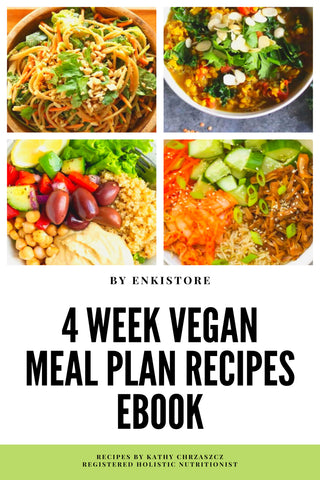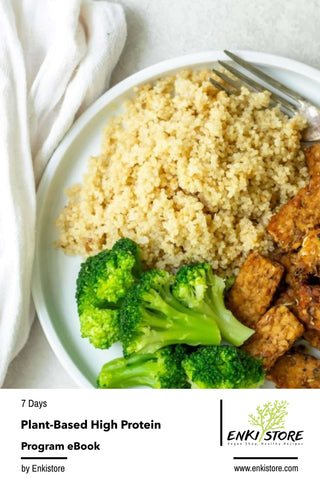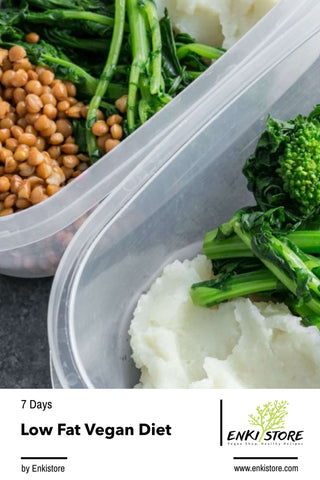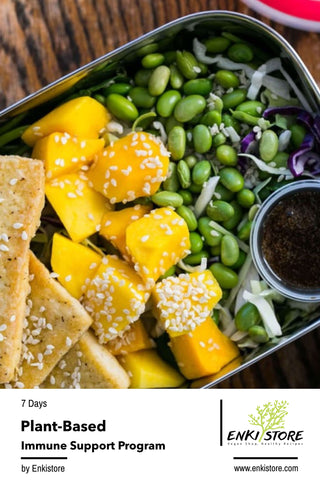Delicious and Nutritious Vegan Meal Plan | Sample Menu Included
July 23, 2023
Enki Store
A Complete Vegan Meal Plan and Sample Menu
At enkistore, we understand that adopting a vegan lifestyle can bring numerous health benefits, including improved weight management and protection against certain chronic diseases. However, we also recognize that finding balanced and healthy vegan meals can be a challenge. Improperly planned vegan diets may lead to nutritional deficiencies and health problems. That's why we've prepared this comprehensive guide to provide you with a well-balanced vegan meal plan and a sample menu to help you get started on your journey to a healthier and more sustainable lifestyle.
Understanding the Vegan Diet
A vegan diet is an eating plan that excludes all animal products, such as meat, fish, eggs, dairy, and honey. People choose veganism for various reasons, including ethical concerns, religious principles, and environmental sustainability. Plant-based diets are believed to generate fewer greenhouse gas emissions and use fewer natural resources, making them more environmentally friendly. Additionally, studies have shown that vegan diets offer several health benefits, including improved heart health, weight loss, and better blood sugar control.The Health Benefits of Veganism
Research has shown that a well-rounded vegan diet can positively impact various aspects of your health. Compared to omnivores (those who eat both meat and plants), vegans have a lower risk of developing high blood pressure, a lower body mass index (BMI), and lower levels of LDL (bad) cholesterol, all of which are risk factors for heart disease. Vegan diets may also aid in weight management, as they tend to result in decreased calorie and fat intake, leading to faster short-term weight loss.
Furthermore, adopting a vegan diet may help with blood sugar control and reduce the risk of diabetes. Studies have demonstrated that vegans are less likely to develop type 2 diabetes compared to omnivores. Veganism has also been linked to a reduced risk of certain cancers, including breast and prostate cancer, and it may alleviate symptoms of osteoarthritis, such as joint pain and swelling.
Building a Balanced Vegan Shopping List
To ensure you receive the necessary nutrients on a vegan diet, it's crucial to include a variety of whole grains, proteins, healthy fats, fruits, and vegetables in your shopping list. Here's a curated list of vegan-friendly foods to get you started:
Fresh Produce
- Vegetables: asparagus, bell peppers, broccoli, cabbage, carrots, cauliflower, garlic, kale, onions, potatoes, spinach, tomatoes, zucchini, etc.
- Fruits: apples, bananas, blueberries, grapes, grapefruit, lemons, limes, kiwis, oranges, peaches, pears, pomegranates, strawberries, etc.
Frozen Produce
- Vegetables: broccoli, Brussels sprouts, butternut squash, carrots, cauliflower, corn, green beans, peas, vegetable medley, etc.
- Fruits: blackberries, blueberries, cherries, mangoes, pineapples, raspberries, strawberries, etc.
Whole Grains
- Barley
- Brown rice
- Buckwheat
- Bulgur
- Farro
- Oats
- Quinoa
- Sorghum
- Teff
Breads and Pastas
- Brown rice pasta
- Whole-wheat pasta
- Sprouted bread, such as Ezekiel bread
- Brown rice wraps
Protein Sources
- Nuts: almonds, Brazil nuts, cashews, hazelnuts, macadamia nuts, peanuts, pecans, pistachios, walnuts, etc.
- Seeds: chia seeds, flax seeds, hemp seeds, pumpkin seeds, sesame seeds, sunflower seeds, etc.
- Legumes: black beans, chickpeas, kidney beans, lentils, navy beans, pinto beans, etc.
- Soy products: tempeh, tofu, etc.
- Protein powders: pea protein powder, brown rice protein, hemp protein, etc.
Dairy Alternatives
- Milk substitutes: almond, cashew, coconut, flax, oat, rice, and soy milks, etc.
- Yogurt substitutes: almond, cashew, coconut, flax, and soy yogurts, etc.
- Vegan cheese: vegan parmesan cheese, shredded and sliced varieties, etc.
Egg Alternatives
- Aquafaba
- Arrowroot powder
- Chia seeds
- Cornstarch
- Flax meal
- Prepackaged vegan egg substitute
- Silken tofu
Healthy Fats
- Avocados
- Avocado oil
- Coconut oil
- Flax oil
- Olive oil
- Unsweetened coconut
- Tahini
Snack Foods
- Edamame
- Dark chocolate
- Dried fruit
- Fruit leather
- Hummus
- Nut butter
- Pita chips
- Popcorn
- Roasted chickpeas
- Seaweed crisps
- Trail mix
Sweeteners
- Coconut sugar
- Dates
- Maple syrup
- Molasses
- Monk fruit
- Stevia
Spices and Condiments
- Cayenne pepper
- Chili powder
- Cinnamon
- Cumin
- Garlic powder
- Ground ginger
- Nutritional yeast
- Paprika
- Pepper
- Rosemary
- Thyme
- Turmeric
Crafting a Delicious Vegan Meal Plan
Now that you have a well-stocked vegan pantry, it's time to put together a sample one-week meal plan to showcase the diversity and deliciousness of plant-based meals. This meal plan includes a variety of nutrient-rich ingredients to meet your daily nutritional needs.
Monday
- Breakfast: Tempeh bacon with sautéed mushrooms, avocado, and wilted arugula
- Lunch: Whole-grain pasta with lentil "meatballs" and a side salad
- Dinner: Cauliflower and chickpea tacos with guacamole and pico de gallo
- Snacks: Air-popped popcorn, kale chips, and trail mix
Tuesday
- Breakfast: Coconut yogurt with berries, walnuts, and chia seeds
- Lunch: Baked tofu with sautéed red cabbage, Brussels sprouts, and herbed couscous
- Dinner: Mushroom lentil loaf with garlic cauliflower and Italian green beans
- Snacks: Bell peppers with guacamole, fruit leather, and seaweed crisps
Wednesday
- Breakfast: Sweet potato toast topped with peanut butter and banana
- Lunch: Tempeh taco salad with quinoa, avocados, tomatoes, onions, beans, and cilantro
- Dinner: Oat risotto with Swiss chard, mushrooms, and butternut squash
- Snacks: Mixed berries, vegan protein shake, and walnuts
Thursday
- Breakfast: Eggless quiche with silken tofu, broccoli, tomatoes, and spinach
- Lunch: Chickpea and spinach curry with brown rice
- Dinner: Mediterranean lentil salad with cucumbers, olives, peppers, sun-dried tomatoes, kale, and parsley
- Snacks: Roasted edamame, sliced pear, and energy balls made from oats, chia seeds, nut butter, and dried fruit
Friday
- Breakfast: Overnight oats with apple slices, pumpkin seeds, cinnamon, and nut butter
- Lunch: Black bean veggie burger with steamed broccoli and sweet potato wedges
- Dinner: Mac and "cheese" with nutritional yeast
and collard greens
- Snacks: Pistachios, homemade granola, and coconut chia pudding
Saturday
- Breakfast: Breakfast skillet with tempeh, broccoli, kale, tomatoes, and zucchini
- Lunch: Garlic-ginger tofu with stir-fried veggies and quinoa
- Dinner: Bean salad with black-eyed peas, tomatoes, corn, bell peppers, and onions
- Snacks: Roasted pumpkin seeds, frozen grapes, and celery with almond butter
Sunday
- Breakfast: Whole-grain toast with avocado and nutritional yeast alongside a vegan protein shake
- Lunch: Lentil chili with grilled asparagus and baked potato
- Dinner: Vegetable paella with brown rice, onions, tomatoes, bell peppers, artichoke, and chickpeas
- Snacks: Almonds, fruit salad, and carrots with hummus
Potential Downsides and Precautions
While a well-planned vegan diet can be highly nutritious, it's essential to be aware of potential nutritional deficiencies that can arise if not properly managed. Some key considerations to keep in mind include:
Nutritional Deficiencies
Vegan diets may be associated with an increased risk of certain nutritional deficiencies, as some essential nutrients are primarily found in animal products. These nutrients include protein, iron, zinc, vitamin B12, phosphorus, and omega-3 fatty acids. Completely cutting out these foods from your diet can lead to an increased risk of issues like anemia, weakened bones, and impaired immunity.
To ensure you meet your nutritional needs, include a variety of nutrient-rich ingredients and fortified foods in your diet. Foods like plant-based milks, cereals, and nutritional yeast can provide vitamin B12 and vitamin D. Protein, zinc, and iron can be obtained from legumes, soy products, nuts, and seeds.
Supplements
Taking a multivitamin or specific supplements can help fill in any nutritional gaps and provide key micronutrients that may be lacking in a vegan diet. For example, vitamin B12, vitamin D, and iodine are commonly found in animal products and certain fortified foods, so supplementing with these nutrients may be necessary.
When considering supplements, aim for a multivitamin that contains vitamin B12, zinc, iron, vitamin D, and calcium. Additionally, higher amounts of vitamin B12 are typically recommended than the Recommended Dietary Allowance (RDA) because your body can only absorb a small amount at a time. Algal oil, a plant-based form of omega-3 fatty acid, is also essential for heart health and brain function.
Remember to consult with a healthcare professional or registered dietitian before starting any supplementation to ensure you are taking the right dosage for your specific needs.
Conclusion
A well-balanced vegan diet can be rich in nutrients and provide numerous health benefits. By including a variety of whole grains, proteins, healthy fats, fruits, and vegetables in your meals, you can create delicious and nutritious plant-based dishes that support your overall well-being. Don't forget to pay attention to potential nutritional deficiencies and consider appropriate supplementation to ensure you're meeting your body's requirements for optimal health.
At enkistore, we encourage you to embrace the power of a plant-based lifestyle and discover the joys of vegan cooking. Whether you're new to veganism or a seasoned vegan, our comprehensive guide and sample meal plan are here to help you on your journey to a healthier, happier, and more sustainable life.
























